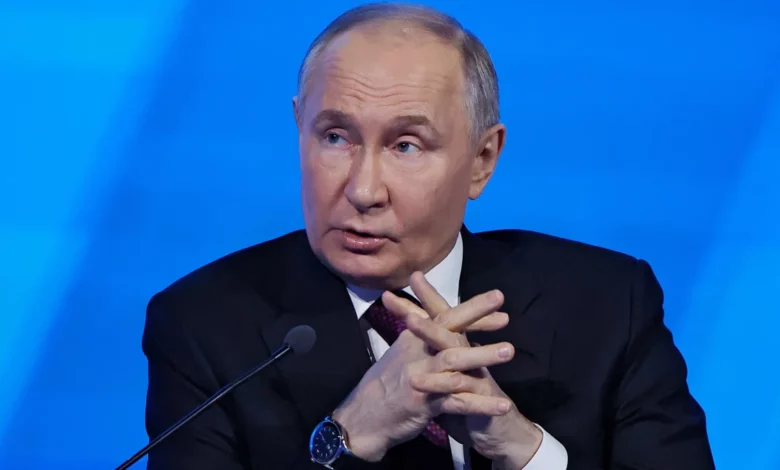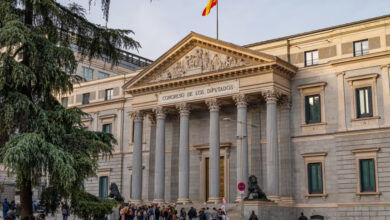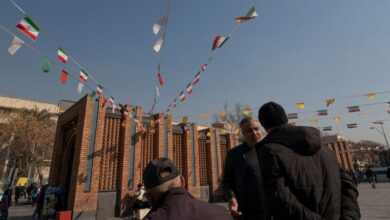
Donald Trump’s administration has ended the Russian president’s international isolation, shattered Western unity on the conflict and cast doubt on how far the US would go to defend Europe, signaling a stunning shift toward Putin and away from America’s traditional allies.
With a flurry of conflicting statements in their first forays into Europe, Trump aides also fueled concerns that the US president will embrace just about any deal with Putin — even if it’s a bad one for Ukraine and a continent whose borders are again threatened by Russian expansionism.
Suggestions that the US will exclude its European friends from peace talks on Ukraine — despite demanding they provide security guarantees and troops as part of any deal to end the war — also triggered alarm in capitals on the continent, with France calling key leaders to an emergency meeting in Paris on Monday.
Trump has also sparked fears that Ukraine itself would not be part of talks that are critical to its survival as a nation after its sovereign territory was invaded by a totalitarian neighbor bringing war crimes, civilian carnage and destruction on its people.
The president on Sunday raised the prospect of a meeting with Putin “very soon.” He told reporters in Florida: “We’re moving along. We’re trying to get a peace with Russia, Ukraine, and we’re working very hard on it.”
After Ukrainian President Volodymyr Zelensky warned on NBC’s “Meet the Press” that he would “never accept any decisions between the United States and Russia about Ukraine,” Trump gave a vague assurance that he would be “involved.”
Rubio says the Saudi talks are a first step
Secretary of State Marco Rubio, national security adviser Mike Waltz and Middle East envoy Steve Witkoff will head the US delegation for talks hosted by the Saudis, who are friendly with both Moscow and the Trump team.
Rubio styled the meeting as a follow-up to Trump’s phone call last week with Putin. “The next few weeks and days will determine whether it’s serious or not,” he said on CBS’ “Face the Nation” on Sunday. “Ultimately, one phone call does not make peace. One phone call does not solve a war as complex as this one.”
Rubio also contradicted comments by Trump’s Ukraine envoy, Keith Kellogg, who said Saturday that while Kyiv would be involved in peace talks, European nations wouldn’t. “If it’s real negotiations — and we’re not there yet — but if that were to happen, Ukraine will have to be involved, because they’re the one that were invaded, and the Europeans will have to be involved because they have sanctions on Putin and Russia as well, and they’ve contributed to this effort,” Rubio said.
The evolving US line on the proposed peace deal shows that it’s often unwise to overreact to the early rhetoric of Trump and his subordinates before the substance of their positions is locked in. Without the new US president’s determination to forge ties with Putin, there’d be little hope of ending a vicious war in the coming months. And there still appears to be substantial room for Ukraine and European states to shape negotiations that can be fully successful only with their buy-in.
Polish Foreign Minister Radek Sikorski said in Munich over the weekend that he thought Trump’s call with Putin was a mistake since it “vindicated” the Russian leader and lowered morale in Ukraine. But he added: “When President Trump says as part of a deal there will have to be European troops, we will have to be asked to supply them, so sooner or later we will have to be involved.”
Still, mixed messages from the administration will fuel concerns that Trump will agree to a deal with Putin that validates the illegal invasion and will then impose it on Ukraine. While most foreign policy realists accept that Ukraine will not get back all the land seized by Russia, Trump was criticized for throwing away leverage with his call with the Russian leader. As was Defense Secretary Pete Hegseth, who said that a peace deal would not include a path to NATO membership for Ukraine and that no US peacekeeping troops would be involved. Some of those statements were later watered down by Hegseth and other administration officials.
Concerns were exacerbated by Trump’s warp-speed attempt last week to fully rehabilitate Putin, an accused war criminal, when he promoted Russia’s foreign policy positions rather than the West’s. The president, for instance, seemed to sympathize with Putin’s rationales for the invasion and called for his return to the G8 grouping of industrialized nations after Russia was kicked out over the annexation of Crimea in 2014. Trump’s rejection of the previous administration’s lockstep coordination with Europe over Ukraine and the absence of Kyiv’s negotiators from the Saudi talks also appeared to seriously weaken the Western negotiating position. European officials are likely to be far more sympathetic to Ukraine’s views than Trump — and so if they are absent from any full-scale negotiations, Zelensky’s position could be severely diminished.
A searing attack on European democracy by Vice President JD Vance at the Munich Security conference — and his decision to meet the leader of the far-right anti-immigrant AfD party just days before the German election — meanwhile shook European leaders. The speech was a clear sign the Trump administration intends to promote many of the populist movements that are evoking dark echoes on a continent twice destroyed by war in the 20th century. And Hegseth’s blunt warning in Brussels last week that Europeans needed to “take ownership of conventional security on the continent” was widely seen as a sign of Trump’s antipathy for NATO and its security umbrella.
All of this is music to Putin’s ears, since it suggests that his status as an international pariah is over, and that he has a deal within reach over Ukraine that would cement his territorial gains. The divisions Trump has opened inside NATO is delivering on one of Russia’s most important foreign policy goals.
“It’s indeed like Easter, Hanukkah, Christmas, (the) birthday of Vladimir Putin and everything is happening in one day,” Alexander Gabuev, director of the Carnegie Russia Eurasia Center, told CNN’s Bianna Golodryga on Sunday. “Whatever Champagne is not chilled is brought to the fridge and other bottles are uncorked.”
France calls emergency meeting
The crisis in transatlantic relations prompted French President Emmanuel Macron to call an informal meeting Monday with the leaders of Germany, Britain, Italy, Poland, Spain, the Netherlands and Denmark, as well as the heads of the European Council, the European Commission and NATO’s secretary general.
While Trump’s hostility to 80 years of post-World War II security policy is a stunning shift in US policy and a sign of his antipathy to internationalist goals, Europe has left itself vulnerable to more isolationist currents in US policy that have long been part of America’s DNA.
Years of strangled defense budgets have left most non-US NATO members poorly prepared for the task of defending Europe and the dominant role the Trump administration is now demanding. Swift increases in defense spending will mean painful choices for leaders who are already struggling to finance welfare states and are hampered by low-growth economies.
But there are already some indications that the Trump administration’s hardline position is concentrating minds as leaders seek to impress the president. British Prime Minister Keir Starmer, who plans to meet with Trump in the coming days, said he’s willing to send British troops to Ukraine as part of any peace deal. Writing in Monday’s Daily Telegraph, Starmer also said European nations “must increase our defense spending and take on a greater role in NATO” — but added that US support would remain critical for guaranteeing peace.
The talks in Saudi Arabia will also highlight another evolving theme in international relations — the growing clout of the kingdom — evidenced by both its growing role under Crown Prince Mohammed bin Salman in Middle East affairs but also by its soft-power initiatives like investments in European sports leagues and its hosting of the 2034 FIFA World Cup.
Trump has made no secret of his admiration for strongmen leaders, and the prince and Putin have a tight relationship. A source close to the Saudi court told CNN’s Alex Marquardt that hosting the talks would enhance the Saudis’ image and prestige and show them to be players on one of the top issues of the day.
Saudi Arabia will be vital to another of Trump’s foreign policy goals — ending the war in Gaza. The administration is trying to coax the Saudis and the Israelis toward a diplomatic normalization agreement that could reshape the geopolitics of the Middle East and solidify an Arab front against Iran. But such a deal would be politically impossible for the Saudis without a path to a state for the Palestinians. And Arab states have pushed back hard against Trump’s extraordinary plan to relocate Palestinians en masse out of Gaza in what would amount to a form of ethnic cleansing.
Trump’s fantastical plan for the US to “own” and redevelop Gaza, as well as his apparent desire to enter talks with Putin on Ukraine, underscore the risks of his unorthodox approach to foreign relations. But the president is back in the White House at a unique moment that offers opportunities to pursue agreements that could make America and the world safer — that is, unless he inks deals that ignore grave security implications.
Sikorski warned in Munich that the president was playing for huge stakes.
“The credibility of the United States depends on how this war (in Ukraine) ends — not just the Trump administration, but the United States itself.”



